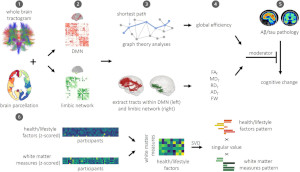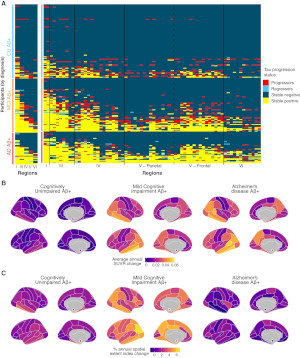Welcome to the Villeneuve Lab
The Villeneuve Lab is interested in how the brain ages, with a specific focus on factors that modify the association between brain lesions and cognitive performance. Our research is motivated by the fact that more than 25% of older adults are considered cognitively normal despite the presence of beta-amyloid in their brain, a hallmark of Alzheimer’s disease. This fact suggests that other factors interact with beta-amyloid to trigger cognitive deficits in Alzheimer’s disease. It also suggests that actions can be taken to prevent or postpone disease-related symptoms. The main focus of the Villeneuve Lab’s research is therefore to examine the factors that protect against, or worsen, the development of cognitive deficits in age-related neurodegenerative diseases.
We use a multi-tier approach that includes molecular PET imaging, MRI imaging, neuropsychological testing and genetics, combined with analytic tools such as deep learning, lasso regression and partial least squares regression.
Visit our research page to learn more about our ongoing projects.
Recent News
| Recent awards June 2024 Congratulations to Jonathan Gallego Rudolf on receiving a Roger J. Paiement Outreach Award to present his work at the Alzheimer’s Association International Conference in Philadelphia and to Amelie Metz on receiving a Marie Giguère Travel Award to present her work at the Organization for Human Brain Mapping’s Annual Meeting in Seoul. Also, a Douglas Open Science Award was awarded to Mohammadali Javanray, Ting Qiu and Jonathan Gallego Rudolf for their project “Open access neuroimaging data derivatives from the PREVENT-AD cohort.” Funding for this award was made possible through the Douglas Foundation and the Tanenbaum Open Science Institute at the Montreal Neurological Institute. |
|
| QBIN Scientific Day May 2024 Villeneuve lab members attended this year’s Québec Bio-imaging Network Scientific Day, held at Concordia University. Ting, Mohammadali, Jonathan and Brandon presented flash talks on their latest research. Brandon received a “best presentation” award. [Presentations] [Photos] |
|
| Healthy Brains Healthy Lives Symposium May 2024 Jonathan was invited to give a flash talk and Amelie presented her recent work at a poster session at the 2024 HBHL Symposium at McGill University. [Presentations] |
|
| Amelie receives FRQS scholarship May 2024 Congratulations to Amelie Metz on having been awarded an FRQS doctoral scholarship! |
|
| New Article from the Villeneuve Lab April 2024 Ting Qiu’s article “Structural white matter properties and cognitive resilience to tau pathology” has been published in Alzheimer’s & Dementia. Our study demonstrates that the macro- and micro-structural properties of the brain’s white matter contribute to cognitive resilience against Alzheimer’s disease, particularly against tau pathology. Our results further reveal that education and vascular health aid in optimizing white matter properties, offering potential strategies to mitigate cognitive decline. [Papers] |
|
| Dr. Villeneuve on CTV News Montreal March 2024 Dr. Sylvia Villeneuve was interviewed by CTV News on why Alzheimer’s disease affects more women than men. [Media and Press] |
|
| New Article from the Villeneuve Lab February 2024 Frédéric St-Onge’s article “Tau accumulation and its spatial progression across the Alzheimer’s disease spectrum” has been published in Brain Communications. We describe the inter-individual heterogeneity in regional tau pathology in the brain across the Alzheimer’s disease spectrum. We found that a measure of the spatial extent of tau pathology is better at identifying certain associations with cognition. [Papers] |
|
| More lab news here. |







